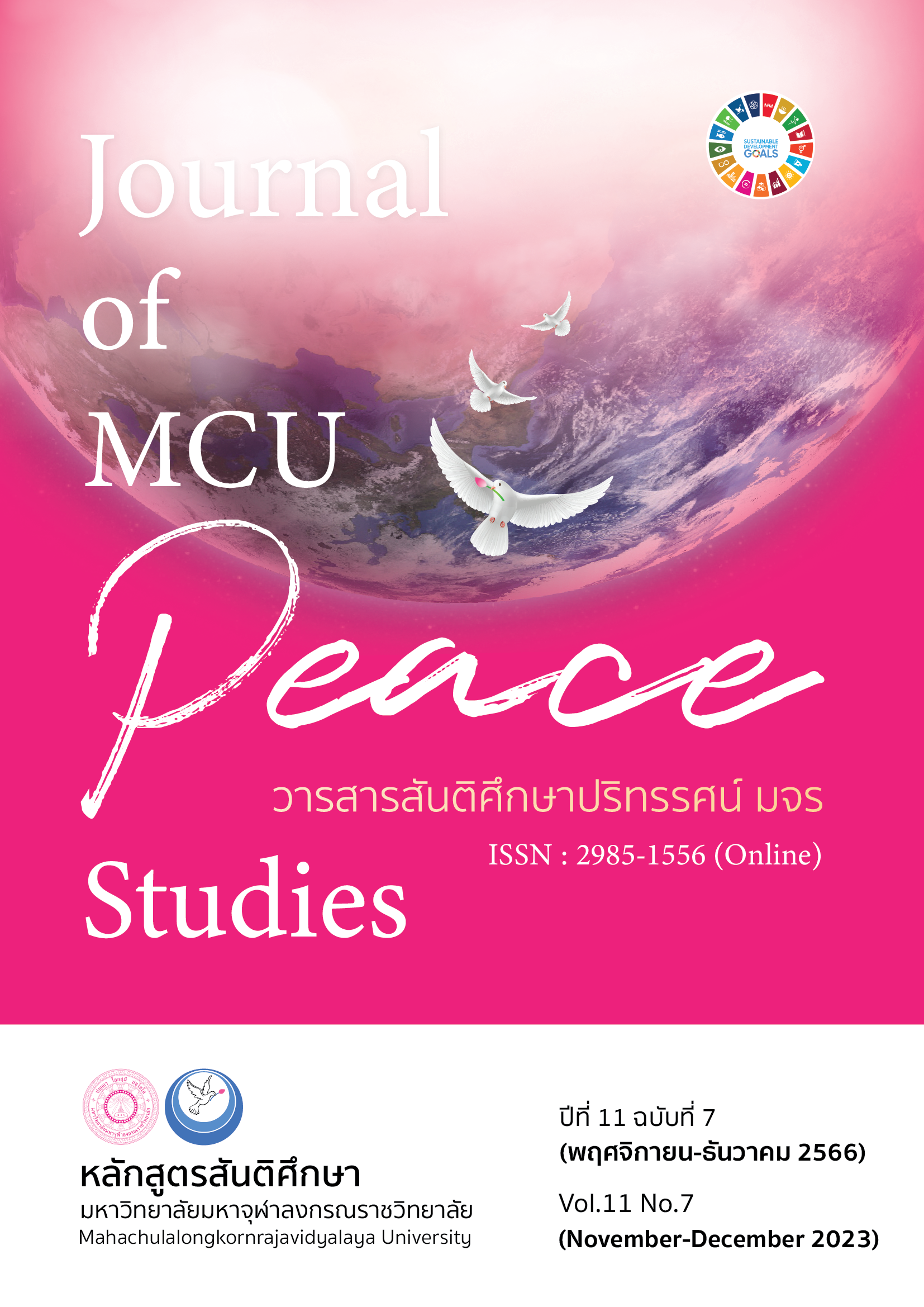Assessing the Bangkok Metropolitan Administration Primary School Students’ Sustainability Leadership Competencies (SSLC)
Main Article Content
บทคัดย่อ
The objective of this research aims to enable Thai education to achieve the global vision, SDG 4 Goal 4.7, by 2030 it is necessary to ensure that all Thai students have the knowledge and skills necessary to promote sustainable development and a more pronounced sustainable lifestyle. It is, therefore, necessary to first identify the current level of the students’ sustainability competencies. This study has two research objectives: (1) to study the conceptual framework of Students’ Sustainability Leadership Competencies (SSLC) and (2) to study the SSLC level of Grades 1-3 students under the Bangkok Metropolitan Administration (BMA). 431 BMA primary schools as the population and 723 Informants were Grade 1-3 teachers and school leaders (Principal, Vice-principal, and Heads of the learning subject groups) from 205 sample schools. The research instrument was the Grade 3 SSLC online assessment form.
The result of the research; the first research objective, turned out the most appropriate SSLC conceptual framework, comprising 5 essential competencies: (1) Sustainability literacy; (2) Proactive values; (3) Systems thinking; (4) External collaboration; (5) Social innovation, 15 general competencies, 33 enabling competencies, and 33 success descriptors, to develop 33 questions of the Grade 3 SSLC online assessment form, using 4 descriptive ratings: (1) students cannot do this yet; (2) students can do some; (3) students can do well; (4) students can teach others. The second research objective, found that the overall BMA Grades 1-3 SSLC level according to the perception of Grade 1-3 teachers and school leaders was in the "student can do some" level, but the arithmetic mean in each Grade was different. Grade 3 students had the highest mean while Grade 1 students had the lowest. This study highlights the need to transform academic management at both the macro and micro levels, in terms of educational policy, curriculum & textbooks, teaching and learning, and assessment for better empowering students to be sustainability leaders who lead the ways to achieve SDGs.
Article Details

อนุญาตภายใต้เงื่อนไข Creative Commons Attribution-NonCommercial-NoDerivatives 4.0 International License.
ทัศนะและความคิดเห็นที่ปรากฏในบทความในวารสาร ถือเป็นความรับผิดชอบของผู้เขียนบทความนั้น และไม่ถือเป็นทัศนะและความรับผิดชอบของกองบรรณาธิการ ยินยอมว่าบทความเป็นลิขสิทธิ์ของวารสาร
เอกสารอ้างอิง
Banno, S. (2020). Educational Management Internship Report: Training Unit: BMA Education Office. (Master’s Thesis). Faculty of Education, Chulalongkorn University. Bangkok.
BMA Strategy and Evaluation Department. (2018). Executive Summary 20-year Development Plan for Bangkok Metropolis. Bangkok: BMA Strategy and Evaluation Department.
Charoenkul, N., & Tomioka, H. (2021). Human Value Creating Global Citizenship: A Lesson Learned from Soka Education and International Perspectives. Kasetsart Journal of Social Sciences, 42(3), 571–576.
Halinen, I. (2017). The Conceptualization of Competencies Related to Sustainable Development and Sustainable Lifestyles (UNESCO Ed.). Switzerland: UNESCO-IBE.
Ikeda, D. (2002). The Challenge of Global Empowerment: Education for a Sustainable Future (July 2002). Retrieved November 18, 2022, from https://www.daisakuikeda.org/sub/resources/works/props/ed-sustain2002.html
Jamaludin, A., Toh, Y., & Hung, D. W. (2018). Empowering Partnership for School-based Innovation Scale and Sustainability. In T. S. H. Koh, David (Ed.). Leadership for Change: The Singapore Schools' Experience (pp. 252). Singapore: World Scientific Publishing Company.
MEXT Japan. (2016). A Guide to Promoting ESD (Education for Sustainable Development). (1st ed.). Japan: Japan National Commission for UNESCO.
NESDC. (2018). National Strategy 2018 - 2037 (Summary). Bangkok: Office of the National Economic and Social Development Council.
OECD. (2018). Handbook Preparing our Youth for an Inclusive and Sustainable World. France: Directorate for Education and Skills, OECD.
Ofei-Manu, P., & Didham, R. J. (2014). Quality Education for Sustainable Development: A Priority in Achieving Sustainability and Well-being for all IGES Policy Briefs (No 28). Hayama: IGES.
ORDPB. (2017). The Royal Development Principles of his Majesty King Bhumibol Adulyadej. Bangkok: Office of the Royal Development Projects Board (ORDPB).
Osman, A., Ladhani, S., Findlater, E., & McKay, V. (2017). Curriculum Framework for the Sustainable Development Goals. United Kingdom: Commonwealth Secretariat.
Russell Reynolds Associates. (2015). Sustainable Leadership: Talent Requirements for Sustainable Enterprises. U.S.A.: Russell Reynolds Associates.
Seameo Innotech. (2018 ). Southeast Asia Teachers Competency Framework (SEA-TCF). Bangkok: The Teachers’ Council of Thailand.
Siamrath Online. (2021, 6 August 2021). "House - Temple - School", the Heart of Community Development According to the Royal Initiative of "KingRama IX". Siamrath Online. Retrieved October 30, 2022, from https://siamrath.co.th/n/268995?fbclid=IwAR0gQb8TAE1KI4_fqKDKrMnNAEMDTWPGyF_dP_AhiyEpUP2uLXTdPMWYRww
Strandberg, C. (2015). Sustainability Talent Management: The New Business Imperative Five Sustainability Leadership Competencies for Your Competency Model. Canada: Strandberg Consulting.
UNEP. (2022). Why Sustainable Lifestyles Matter. What We Do. Retrieved November 18, 2022, from https://www.unep.org/explore-topics/resource-efficiency/what-we-do/sustain able-lifestyles/why-sustainable-lifestyles
UNESCO. (2017). Education for Sustainable Development Goals: Learning Objectives. France: UNESCO.
UNESCO. (2019). SDG Resources for Educators, Education. Retrieved November 18, 2022, from https://en.unesco.org/themes/education/sdgs/material/01#primary
Winichakul, W. (2021). 20 Years of Thailand and the Development of Human Quality. Common INFO. Retrieved November 18, 2022, from https://www.thekommon.co/20-years-thailand-people-quality/?fbclid=IwAR10shUR4L9vkeFOpsNi3mluGQ-k0I9YjM4lZjJ_hNNVkP5EzLlvMv8NhiI


